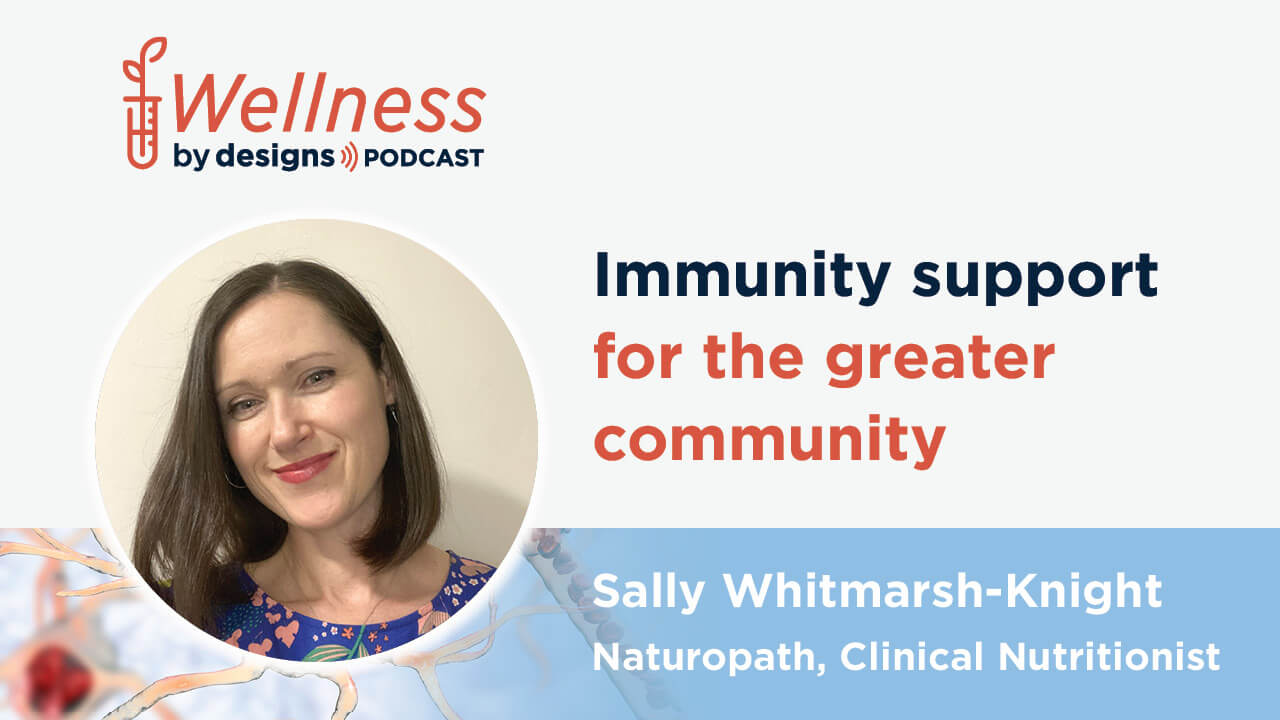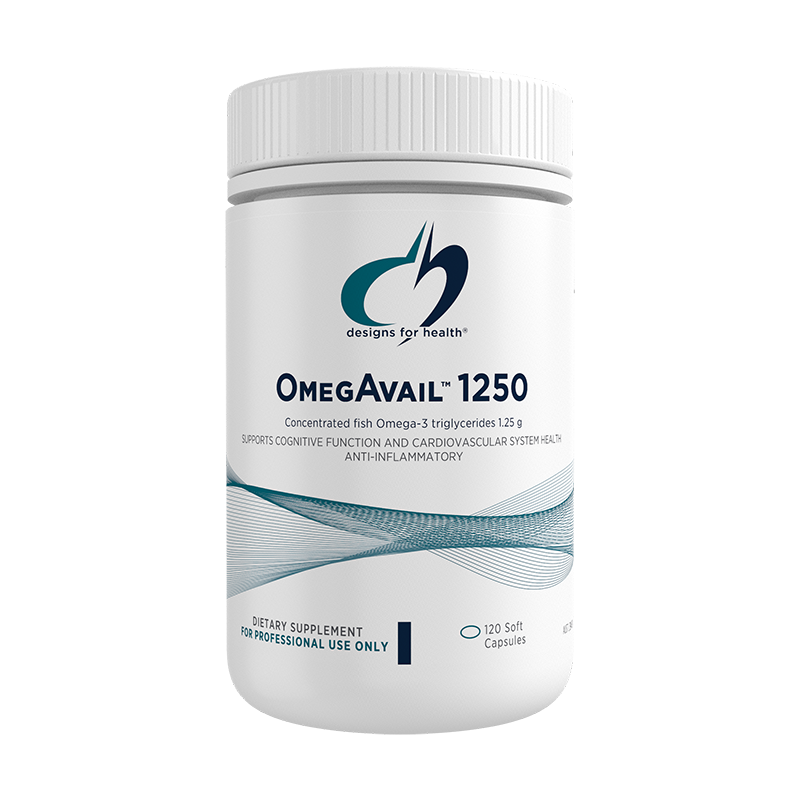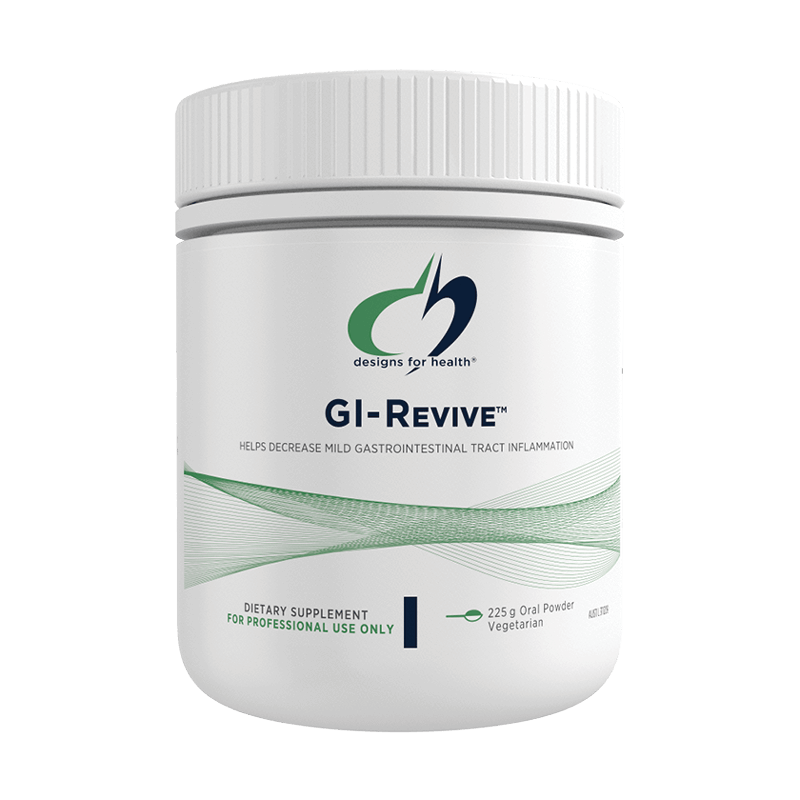

Immunity Support for the Greater Community
Today we welcome Sally Whitmarsh-Knight, a Naturopath and Clinical Nutritionist of over 20 years to Wellness by Designs.
Sally has focused her knowledge in the pharmacy setting. Providing Naturopathic consults focusing on family health, and today we are discussing a hot topic of Immune Support in the Greater Community.
About Sally:
Sally Whitmarsh-Knight has been practising as a Naturopath for over 20 years. During this time Sally has focused her knowledge in the pharmacy setting. Providing Naturopathic consults focusing on family health, fertility, weight loss and general wellbeing.
Sally’s passion is to provide as many people with tools for a healthy life. Sally divides her time at the pharmacy, finishing a Bachelor of Clinical Nutrition and family life with 2 teenagers.
As a qualified Naturopath for 20 years, Sally has worked in many pharmacies combining advice on supplements, herbal medicine, and nutrition with allopathic treatments. Conducting consults within a clinic space and advice on the shop floor, Sally has been able to provide care to a wide range of clientele.
Growing up in a household that mainly served packaged and frozen foods, Sally embraced her multicultural neighbourhood. Through childhood friends she observed the Mediterranean diet, and therefore the joy of cooking, growing healthy produce and the importance of healthy eating. This leads to a passion for natural medicine and an understanding that a healthy lifestyle can turn your health around.
Working in pharmacies has been a unique place to reach a varied audience. Understanding pathologies and their prescribed pharmaceuticals, has provided an opportunity to recommend diet, lifestyle and supplement advice to customers. Many of which would not ordinarily have exposure to natural medicine.
Having worked at Gaslight Pharmacy for over ten years means that Sally has been able to build relationships with a large part of the community. Treating babies, children, their parents and often grandparents. Having a place where a patient can ask about their medicine as well as preventative and supportive help, brings about holistic care.
Connect with Sally:
Website: Gaslight Pharmacy Rose Bay
About Gaslight Pharmacy:
An institution in the eastern suburbs, opening 7 days a week, 365 days of the year. Cutting edge facilities, providing naturopathic assistance, practitioner only supplements, consulting rooms and a compounding lab able to provide personalised medication.
Transcript
Introduction
Andrew: This is “Wellness by Designs,” and I’m your host, Andrew Whitfield-Cook. Joining us today is Sally Whitmarsh-Knight. And today, we’re gonna be discussing immune support in the greater community. Welcome to “Wellness by Designs.” Sally, how are you?
Sally: Good. Thank you. Thank you for having me, Andrew.
Andrew: Absolute pleasure. Now, you are a naturopath who works in a clinical setting in a pharmacy. So, that’s called a retail setting to most clinicians in Australia. Tell us about your work and your responsibilities in the pharmacy setting.
Sally: It is a really fascinating place to work. You see a lot of very different people. You see a lot of conditions, and it’s fast-paced. You have to think on the spot. You have to work out remedies instantly. You also have to follow up with a person. You also have to make sure that they understand what you’re saying, that the medication that they’re taking and the supplements that you are giving don’t interact. Being in a pharmacy, I’m able to chat to the dispensary staff so I can check if there are any interactions, but I also ring up helplines all the time and make sure that I’m giving the right product out.
Andrew: Yeah. Brilliant. So, let’s talk about that co-prescribing work, you know, in the pharmacy setting. It’s not uncommon for patients when they go and see a naturopath in the clinic to have a swathe of pharmaceutical medications that they’re on. But how do you work that in? How does that actually work from a practical perspective? Does everybody bring their medicines in, or do you work off the history that you have in the pharmacy?
Sally: I do both. If they’re a regular customer, I have access to the software. So, I know what customers are on, what their recent medication is. And with that knowledge, I can assess whether certain things will be an interaction. So, for example, if they’re on blood thinners, it’s really important if I give anything with herbs in it that I’m not going to thin the blood further. Also, if they are on blood thinners, sometimes they can have fish oil and it’s absolutely fine, but I always make sure that the patient knows that, and they’re also communicating with the doctor. So, it’s a bit of research and it’s just stopping and pausing and just making sure that above all else, the customer’s health is first. And if I feel safe, I will recommend it. But I’m often saying, “I’m sorry. I’m gonna focus on diet with you and I’m gonna focus on your lifestyle instead.”
Andrew: Must be frustrating, though, when we as natural health practitioners are aware of relevant dosages that actually have real clinical impacts on medications, and yet, you are speaking with mainly doctors who have no real knowledge of natural medicine. And so as soon as they see a name, it falls into that basket. For instance, there’s a very good paper and forgive me the author, I think it’s Hope, but I’ll put it up on the show notes, and it’s got a graph with dose and effect. And so it pointedly demonstrates that to get an anticoagulant effect from fish oil, for instance, you’ve gotta use grams and grams of the stuff. So, for somebody taking say, two capsules of fish oil, that’s not really gonna have a clinical effect. And yet you’d say that to a doctor and they’ll go, “Nope. Can’t take it.” So, do you get really frustrated with that sort of thing? Or do you have hints and tips that you can take us through to educate other people about the real issues?
Sally: You are right about wanting to give the actual therapeutic dose. Whenever I’m with a customer, I’m mindful. I wanna get it right. I want them to get good results. And I know that if I generally use practitioner products and I’m using the correct dosage, most of the time I am gonna get a good effect, and they then will come back, and the whole exchange has been worth it. But because I’ve been in this industry for so long, even though I go, “It’s only two fish oil. You can handle it. It’ll be fine.” I still occasionally do get that person that it’s an issue. And I love fish oil and I love going up to four a day, but I have had customers come back and they’ve got easy bruising.
So, I look at who’s in front of me, and I decide whether I’m gonna go a little bit more gutsy or whether I’m gonna hold back. Now, when I hold back, I like for them to come back and see me. So, if we do one a day, say, the fish oil, I see how that goes. If it’s all looking good, I then will increase. And I then have the confidence in the customer and I know that that’s gonna be okay. But I do like them to ask their doctor. But I often think when it comes to supplements, I know more than they do, and yet, I have to wait for their approval. And that, unfortunately, is just the way it is.
Andrew: Yeah. Okay. So, we’re gonna be discussing immunity in the greater community. And I think this is one of the great aspects of having a natural health practitioner in a pharmacy because you are the people who know about how to effectively and equitably and ethically manage nutritional support, particularly when they’re on pharmaceutical medications. So, let’s talk about viruses because, you know, that’s one of the main issues that’s poked its head up in the last couple of years.
But we are not just talking about COVID 19 and supporting people through their infection there. But also things like…you know, there’s very common things like herpes, there’s, you know, EBV. There’s heaps and heaps of viruses, which you’ve gotta support patient’s immune system, and you have this sort of community responsibility in the pharmacy. So, how do they present? I know this is, like, different for each virus, but as a generality, maybe there are some specifics, how do you find patients presenting to you in a pharmacy? Is it mainly in the acute phase, chronic phase, what?
Sally: I see all phases. Generally, if someone gets a positive result, they may have no symptoms at all. And I’ll have the conversation about just general immune boosting. And I think that’s really important because it’s like a battlefield. You just want more soldiers. You want more white blood cells. You want your body to respond in the appropriate manner. And then I get people who have really classic, kind of, cold and flu symptoms, and for them, I always use my basics to boost their immune system.
Now, not everybody is into natural medicine. So for that category, I do just treat the symptoms on the spot. So, we get a lot of people showing up with fever, sore throat, diarrhea, lethargy, aches and pains, and sweats. And they’re all your classic kind of cold and flu symptoms. So, we’ve been using such fantastic immune boosters, and that’s what generally I rely on. And for myself, whenever I’ve had an infection, I found these key core ingredients really helpful for me.
Andrew: Right. Gotcha. You mentioned something really interesting there and that is the gastric effects, the gastric symptoms that are commonly seen, hardly ever spoken about in the media. It’s really interesting. And yet the ACE2 receptors have a great preponderance in the gastrointestinal lining. How do you approach this when we’re talking about that concept of immune modulation versus anti-inflammatory stuff to sort of mitigating any runaway inflammatory effects. What sort of supplements do you advocate the use of there?
Sally: Generally, for any GIT symptoms. So, one of the…I guess the more prominent one at the moment is diarrhea. And you can make such an impact if you use SB. And I’ve been using SB for many years. And I find with that particular probiotic, that it’s dose-related to the person. So, I get customers to generally take one up to four times a day. So, generally, one after every loose stool, because if you do too much, you can go the opposite way. But it’s much better to slow down diarrhea, so you can get the virus out. But also with SB, it grabs hold and it stops replication and it takes it out. So, you’re not just saying to a customer, “I’m gonna treat this diarrhea.” You’re actually saying, “I’m gonna slow it down,” which also helps with dehydration. And you’re also going to manage to deal with the virus or the parasite or the fungal. And for a customer, that with, you know, your electrolytes, and rest are really important when it comes to those GIT symptoms.
Andrew: Sally, thank you. You’ve actually changed the way that I think. Very interesting point you just said about…because I’ve often said about why are you taking these medications that bind you up when you have diarrhea when you’ve got an infectious agent that you’re just gonna keep inside you. And yet with SB, for instance, I’ve been rather heroic with its dosage. But I do take your point about just slowing it down and controlling it, but allowing the body to excrete viral particles as a means of getting well. Well done. Thank you. Note to self. So, with regards to other things that you use so, you know, the common herbs, echinacea, Andrographis, astragalus or astragalus, whichever school you came from. What about mushrooms? Things like that. Do you tend to use these a lot?
Sally: Always. Yeah. I love mushrooms. Mushrooms are a bit of a hero and I don’t know why, we always forget about it. We all love Andrographis, and we love echinacea, and we love astragalus, especially when they’re run down, but your mushrooms, we always seem to forget. And for me in clinical practice, when nothing else works, for me, mushrooms seem to be the one that will turn a state around. And I’ve used it in chronic fatigue, Epstein-Barr virus, people generally being run down, people when they come to you with their bloods and you see that their white blood cells really low. These are the things that I find. I can see the results in their blood work later after I’ve put them on it, and they do start to feel better. So, while I do love my herbs, like the echinacea and Andrographis, I also love the medicinal mushrooms. I think together they work. Work really well.
Andrew: Yeah. You know, that’s a really interesting point you make about Andrographis. And I’ve thought about this, particularly with trying to support patients, certainly earlier on in the piece with COVID when there was a preponderance of the presenting symptoms of a lack of taste and smell. And there is that issue in certain…it’s been in research, but it certainly appears with certain extracts of Andrographis where it sort of has this knockout effect of the sense of taste. And so I’ve sort of shied away from it purely because of, A, is it the virus or is it the herb that I’m giving that’s, you know, prolonging that symptom? So I’ve tended to sort of shy away from it. What’s your experience been of Andrographis? Have you had any issues?
Sally: I have seen that. I really have. And I don’t see it with every product myself, but I am mindful of it and I don’t go in hard. I tend to just step back a bit and just see how the customer reacts. I have had people with skin rashes and the loss of taste, and often they don’t know that it’s because of that particular herb. It is a bit confusing at the moment because a lot of people also have a loss of taste and smell with the virus going around at the moment, so I do throw zinc into the picture just in case I’ve misread the symptoms.
Andrew: Gotcha. Any particular form of zinc that you like? Like, I remember the early days, for sore throats, it was zinc gluconate, particularly these lozenges that tasted disgusting. They were horrible, but I guess that means my zinc status was okay. But is there any form of zinc that you give or do you just give a tablet of zinc and let it go throughout the body?
Sally: I kind of use all of it. I have people wanting a lot of strange things because they see things on the internet and, you know, they want zinc picolinate. We’ve got such great things in Australia, and they’re TGA-approved. So, I much rather recommend what I’m used to recommending and what I know that works. So, I’m really happy with citrate, glycinate, and chelate. I don’t mind if it’s a chewable, or if it’s a drop, or it’s a liquid, or in a capsule. For me, the main thing with zinc is that the patient always has it with food.
Andrew: Good point. Very good point. So, what other sort of things can we talk about with regards to the acute stage versus the chronic stage? You mentioned chronic fatigue. There’s obviously, you know, cytomegalovirus, there’s EBV, viruses that infect a large percentage of the population, but they affect some people drastically. Tell us what sort of things you look for with support there. We’ve gone through mushrooms. What about energetics? Things like, let’s say, CoQ10, magnesium?
Sally: I love those. I’m having a lot of patients come in who are really fatigued, they’ve had a virus. And I’ve had patients coming in and they’ve had an illness, they’ve had an infection, and they’re really run down. So, I find CoQ10, or if I can, the ubiquinol form. I just find that’s much better absorbed. I get a faster result, and I also can dose accordingly. So, generally, with ubiquinol, I’ll do one or two a day. And I found with ubiquinol, you can stop and start it, and customers like that. They think, “Oh, something else I have to take every day.” CoQ10 is just when you’re feeling tired, and you gotta get through your day, and you have to do your best. So, I think it’s a cheat because it works so well.
So, I recommend that. And I know it’s one of those ones that if you have it, you know the customer is gonna come back and is gonna say, “I feel better,” and will want more because they do notice a difference on CoQ10. And it’s also…in pharmacy, so many people are on statins and statins reduce your CoQ10. So, I’m replacing a deficiency, but I’m also working on their energy levels. It’s also an antioxidant, good for cardiovascular health. So, I get so many more actions out of it. Just also a benefit, it being great for fatigue. But also with fatigue, I might look at other mitochondrial products, I could do carnitine. I like glutathione to mop up the free radical damage. I often use that, especially if people feel tired and lethargic and they just wanna get back. I do find that glutathione will improve the person’s energy as well. So, that’s another one that I do love to use.
Andrew: And mushrooms. Always mushrooms.
Sally: Yeah.
Andrew: One of the things I was gonna ask is, do you tend to teach people to start educating them about including these medicinal mushrooms, at least some of them, in their diet as well. Like, for instance, enoki mushrooms are widely available, shiitake mushrooms, very freely available. It’s just that they don’t put them in a salad. It’s not like a…you know, I am weird. Okay. I admit I’m weird. I’ll have a mushroom and alfalfa sandwich. Okay, I get it. Yeah. But teaching people to use these in soups, teaching them to cook with them on the barbecue so that they can have them with a steak, and to mix them up, and they can have these beautiful, rich flavours coming out. They’re not horrible. They’re gorgeous, but I don’t eat them fresh. I’m not used to that palette. Do you teach them about this, your patients?
Sally: Yeah. I do spend a lot of my time educating on good food choices. I do a lot of handouts, so it’s just quick and easy for them. I make it super simple. I don’t overwhelm them. But I do plant seeds and I think that’s really important. So, for someone who’s never tried that sandwich that you’ve had, you know, just give it a go. Just start incorporating these food choices into your daily meals, even if it’s just one new meal a week, where maybe you are doing fermented cabbage, or, you know, you’re having four cups of veg, which is so amazing. Most people don’t strive for that amount, rainbow of colours in your food, you know, good quality protein, minimize your carbohydrates in your meals.
So, you just tell them key points and you get the feedback from them, whether they’re willing to do it. If they’re a bit overwhelmed, I step back and just give one tip because I know that’s pretty much all they can do. And I write it down, and I also give the food choices there, so they always can go back to it. I also like my customers to put these notes on the fridge, so when they see it, they go, “Oh, that’s right. Yeah. Okay. So, I need to include raw seeds in my diet. Okay. How about I try some raw nuts.” And bit by bit, you can turn people’s health around with good nutrition.
Andrew: With regards to basic immune deficiencies that are inhibiting somebody’s immune system. Like, how far do you go back? How remedial do you get when you are interviewing somebody about their requirements, about their needs? Do you go right back to, for instance, what is it? 12% of teenage girls are iron deficient because they’ve got heavy periods. So, just incorporating an iron supplement judiciously and with the knowledge that they haven’t got hemochromatosis, is my only sort of salient warning there. Do you go right back to these simple nutritional deficiencies and start from there, or do you have a standard herbal repertoire that you engage first? How does it work?
Sally: I do try to be as holistic as possible and look at the person in front of me. Just like with our training, just the pallor of the skin, their posture. You can get so much just by looking at someone and listening to their conversation. And you are right about, you know, there are classics. You know, you’re in the right ballpark if you do have a teenage girl and she’s looking really pale pale lips. She says she’s fatigued. She doesn’t eat a wide variety of food. You know, it’s pretty easy to recommend a nice iron supplement. Being on the shop floor, we’re restricted to 24 milligrams of iron, so I’m mindful of that. And I also make sure I’ve got the co-factors in there, so whatever I give, I’m gonna get the best absorption.
But also just general knowledge. If you do take an iron supplement, keep it away from dairy. Like, that’s so important. And, you know, make sure the time of the day, it’s better in the morning. Other key things, I’ve also found young kids that are a bit in the afternoon. That’s often a sign of iron deficiency. So, all those sorts of things, you sort of pull it all together and then you go back to their presenting symptoms, which, for example, is their immune system because they have a virus. You sort of bring it all back in and you know if you give vitamin C, that’s gonna help with the iron absorption anyway. And if you talk about green leafy veg, sometimes saying that to someone, they know it, but you’re reminding them and they’re gonna pull all that information together.
Andrew: Got it. And so moving on now to a more chronic phase. We’re now experiencing more and more people who are experiencing long COVID. And to the point where there’s now, I think a clinic in Melbourne, which specializes in it, forgive me if I’m wrong. How are these patients presenting? Is there any sort of nuance to their presentation and when are they presenting? Are they presenting immediately after the acute phase of COVID is finished, or is there a lag time between when they experience long COVID? And forgive me, I should just clarify that. The long COVID is…is it three months of fatigue? So, there’s at least, you know, let’s say, three and a half months since first infection where you can say it’s long COVID. But I’ve heard that there’s this lag time that it sort of re-presents. I’ve never found any data on it though. Have you heard this?
Sally: I’ve seen customers who have a cough that possibly they’ve had maybe four to six weeks and the doctors are calling that long COVID. So, I think because Australia has been in a bit of a bubble, I’m only just now seeing long COVID symptoms and I’m fascinated because I haven’t seen it until now. And the symptoms are strange. I’m getting a lot of customers who have extreme thirst. They can drink all day long, but they are still thirsty.
So, with that group, besides talking about food, I’m also giving them a good B group. I’m also talking about maybe giving alkalizing formulations just to get that water back up, magnesium, and get the water back up into the cells. I’ve had a few cases of stomatitis, so cuts on the sides of the mouth. And for me, it’s a mixture of giving a really good B complex.
So, nutritionally, their body has just used everything up to fight the virus and they really are depleted. So, a good B group will also help with the energy and also stress. But I might also give them vitamin C for healing as well in that particular case. I am also seeing a bit of depression, a bit blue. So, in that case, I love vitamin D. I found vitamin D fantastic for lifting people’s moods, especially after infection. I find we’ve used so much of our body’s defences that it is affected.
I also, in that case, with mood, I might throw in a probiotic as well. So, the symptoms are varied. I also have really strange customers who have particular joint pains, sites of old wounds still aching weeks after having the infection. And in that case, I love glutathione, I think, mopping up free radicals, is always good, but I love my turmeric as well. I find giving good anti-inflammatories and back to your basic fish oils are really good at just bringing the customer out of that long COVID phase or at least trying to or working in that direction.
Andrew: That’s really interesting that a lot of those things are also anti-inflammatory, which is sort of this explanation of the overactive immune system with cytokine storm with that sort of thing. Not that we are talking about a cytokine storm, you know, it’s a pretty emergent situation, but this prevention of this smouldering inflammation which prolongs pain certainly, but also interestingly, old injuries. This sort of re-presentation pain in old injuries. That’s very interesting. Never seen that. What about herbs? Do you have, like, a herbal dispensary at your availability? Do you use things like wild cherry for that postviral cough, marshmallow, licorice, that sort of stuff?
Sally: I don’t have a herbal dispensary. And I have had herbal dispensaries in the past. I do miss making my herbs. But I do have so many products that I can work with, and I make do quite fine with what I have. But I’m a big fan of ivy leaf. I think that people with…if they do have a cough, even a dry cough, but particularly a chesty cough, I love to give ivy leaf. And it’s such a safe herb. I’ll give it to young children and to adults. And I find the beauty of that is about half an hour after you give that particular herb, you can hear that cough break. And when you hear that break, if it’s a child, I’ll get the parents to do percussion on the child’s back just to loosen that cough up.
And I also find…I get patients to try the huff cough. And if they don’t know what that is, I get them to go on YouTube. So, it’s all these really great techniques that can move mucus because we forget that, you know, you might be in acute phase with a chesty cough, but if all that hangs there, you could have a secondary infection. And I really think that’s when natural medicine is at the forefront because we can boost that immune system, move that mucus, and stop these secondary infections, which can lead to being on antibiotics. So, it’s such a great space to make such a difference for a customer.
Andrew: Well done. Thank you for reminding us. Simple things like, you know, a steamy bathroom, take the child into there and get the steam to help you loosen the mucus, gentle percussion that, you know, just this sort of playful percussion can be quite therapeutic. Good tips. Really good stuff. What about though, when, you know, the use of natural medicines might not be enough. Let’s say, you’ve got quite thick mucus. Do you ever employ, let’s say, pharmaceutical mucolytics?
Sally: Yeah, I do. Yeah, I do. And I found with, particularly children, is that they can cough weeks, and we think that’s terrible. But it’s quite common that they really cough for weeks. And you often can’t give them a liquid mixture because sorbitol gives them diarrhea. And you can give a mixture like that for maybe a week, but the body just can’t cope with it past that point.
So, I will go for a tablet form, which has the bromhexine or the guaifenesin and that will lift that mucus off the chest. You still keep making it. You’re not stopping it, but you are making it thinner so they can cough more efficiently, but not cough as much because each cough is moving that mucus out. So, I’m really quite happy to use the tools I have in the shop. So, those pharmaceuticals, more than happy to. Also, it’s just what the customer wants.
Some people don’t want any natural medicine and they would prefer that. I also like an iodine throat gargle at the start of infection. I find that really effective as well. Still love my marshmallow and honey and sage, all those great things, telling them to have a good cup of tea with ginger and honey, all those basics. Definitely room for all of that and a lot of customers are really happy to embrace all of it. I think if you’re unwell to just get a cold and flu tablet is such a shame because you’re really just doing this bandaid effect.
Having those immune boosters like your D, your C, and your zinc can just decrease the time that that person is unwell and also the level of symptoms. And on the shop floor, it’s really about chatting to the customer and seeing if you really can recommend these products. And sometimes, you know, I can fit it all in one capsule, and they’ve only got one product, and they’re really happy I haven’t overwhelmed them. And other people really want to get almost everything they can to sort out an issue.
Andrew: Yeah. I used to love it. I actually really enjoyed my time consulting in pharmacy and I used to love that cough and cold thing. They’d be the patients that they come in with an acute cold, it’s just hit them. So, “Tell us what you’re after. Like, do you want to get rid of the cold, or do you just want to get rid of the symptoms?”
And some people, “I just need something to, you know, soldier on,” forgive the glib thing. We shouldn’t take heed of that anymore, by the way. But, you know, “I just want something to get rid of the symptoms.” Whereas other people, they’ve used up their sick leave. It’s really important, they’re the major breadwinner. They can’t be sick. So, they’re going, “No. I need to get well, not just relieve the symptoms.” And they’re the people that would be more engaged with investigating natural medicines, particularly herbs I used to find, to help get them better.
Just a last question for you, Sally, and that is with regards to inter-referral. Like, when do you find it’s appropriate to go, “I’m not happy with how severe this is.” Maybe the young presentation. Maybe you find some worrying symptoms in the virus, some hallmark signs of a certain virus, which it’s ethical to refer on. How do you handle that referring on to other clinical services?
Sally: Yeah. If I start to worry or if any alarm bells come, I’ll generally chat to the pharmacist to get further advice. But if people are having issues with a very high fever, a sustained high fever, feeling pain in their chest, tightness in the chest, issues with breathing, if they’re so lethargic and they’re not getting out of bed, that’s another alarm bell. Also, age. If they’re over 65, I’m more cautious. And if they’re an infant, I’m also more cautious as well. I guess a good tip is, especially with kids, if you’ve got a kid that’s a little bit sick in the morning, it doesn’t mean they’re gonna be still okay at night. Kids change quickly and you’ve sort of always wanna have a plan on, okay, it’s Friday. I really should go to the doctor now because, you know, it’s the weekend. You sort of have to plan all those just-in-case scenarios.
Andrew: Yeah. Well done. Sally, thank you so much. This has been quite enlightening on a couple of points for me here. Thank you so much for taking us through how you help in the greater community, helping them to support their immunity, particularly with viral infections.
Sally: Thank you so much.
Andrew: Remember, you can catch up on the show notes for this podcast, plus all the other podcasts on the designs for health website. And I thank you for joining us. I’m Andrew Whitfield-Cook. This is “Wellness by Designs.”








 Essential Insights into Gallbladder Function and Care with Amie Skilton
Essential Insights into Gallbladder Function and Care with Amie Skilton Natural Strategies for Men’s Health with Naturopath Jason Mallia
Natural Strategies for Men’s Health with Naturopath Jason Mallia Exploring Extemporaneous Compounding with Diana Boot
Exploring Extemporaneous Compounding with Diana Boot